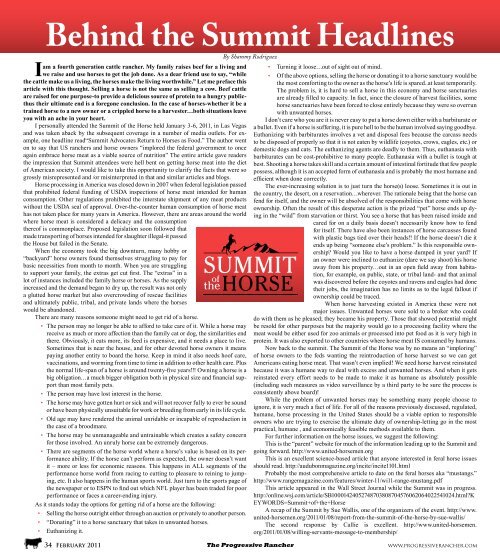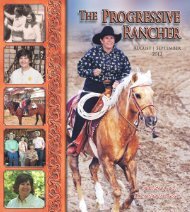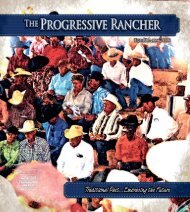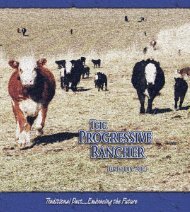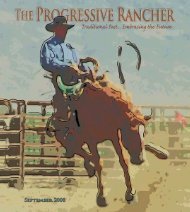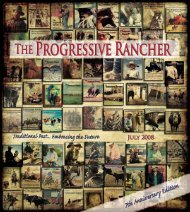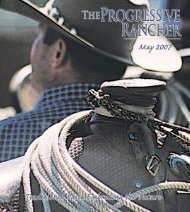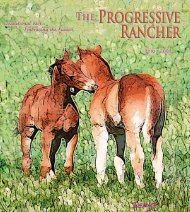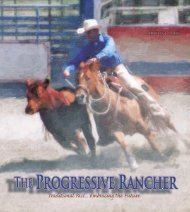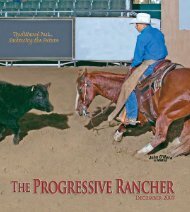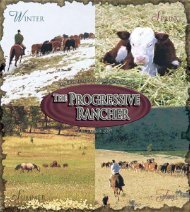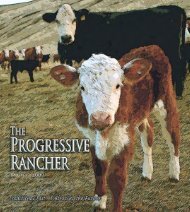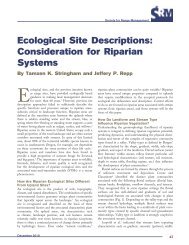fallon Bull Sale - The Progressive Rancher Magazine
fallon Bull Sale - The Progressive Rancher Magazine
fallon Bull Sale - The Progressive Rancher Magazine
You also want an ePaper? Increase the reach of your titles
YUMPU automatically turns print PDFs into web optimized ePapers that Google loves.
Behind the Summit Headlines<br />
By Shammy Rodriguez<br />
am a fourth generation cattle rancher. My family raises beef for a living and • Turning it loose…out of sight out of mind.<br />
I we raise and use horses to get the job done. As a dear friend use to say, “while • Of the above options, selling the horse or donating it to a horse sanctuary would be<br />
the cattle make us a living, the horses make the living worthwhile.” Let me preface this the most comforting to the owner as the horse’s life is spared..at least temporarily.<br />
article with this thought. Selling a horse is not the same as selling a cow. Beef cattle <strong>The</strong> problem is, it is hard to sell a horse in this economy and horse sanctuaries<br />
are raised for one purpose-to provide a delicious source of protein to a hungry publicthus<br />
their ultimate end is a foregone conclusion. In the case of horses-whether it be a horse sanctuaries have been forced to close entirely because they were so overrun<br />
are already filled to capacity. In fact, since the closure of harvest facilities, some<br />
trained horse to a new owner or a crippled horse to a harvester…both situations leave with unwanted horses.<br />
you with an ache in your heart.<br />
I don’t care who you are it is never easy to put a horse down either with a barbiturate or<br />
I personally attended the Summit of the Horse held January 3-6, 2011, in Las Vegas a bullet. Even if a horse is suffering, it is pure hell to be the human involved saying goodbye.<br />
and was taken aback by the subsequent coverage in a number of media outlets. For example,<br />
one headline read“Summit Advocates Return to Horses as Food.” <strong>The</strong> author went to be disposed of properly so that it is not eaten by wildlife (coyotes, crows, eagles, etc.) or<br />
Euthanizing with barbiturates involves a vet and disposal fees because the carcass needs<br />
on to say that US ranchers and horse owners “implored the federal government to once domestic dogs and cats. <strong>The</strong> euthanizing agents are deadly to them. Thus, euthanasia with<br />
again embrace horse meat as a viable source of nutrition” <strong>The</strong> entire article gave readers barbiturates can be cost-prohibitive to many people. Euthanasia with a bullet is tough at<br />
the impression that Summit attendees were hell bent on getting horse meat into the diet best. Shooting a horse takes skill and a certain amount of intestinal fortitude that few people<br />
of American society. I would like to take this opportunity to clarify the facts that were so possess, although it is an accepted form of euthanasia and is probably the most humane and<br />
grossly misrepresented and /or misinterpreted in that and similar articles and blogs. efficient when done correctly.<br />
Horse processing in America was closed down in 2007 when federal legislation passed <strong>The</strong> ever-increasing solution is to just turn the horse(s) loose. Sometimes it is out in<br />
that prohibited federal funding of USDA inspections of horse meat intended for human the country, the desert, on a reservation…wherever. <strong>The</strong> rationale being that the horse can<br />
consumption. Other regulations prohibited the interstate shipment of any meat products fend for itself, and the owner will be absolved of the responsibilities that come with horse<br />
without the USDA seal of approval. Over-the-counter human consumption of horse meat ownership. Often the result of this desperate action is the prized “pet” horse ends up dying<br />
in the “wild” from starvation or thirst. You see a horse that has been raised inside and<br />
has not taken place for many years in America. However, there are areas around the world<br />
where horse meat is considered a delicacy and the consumption<br />
cared for on a daily basis doesn’t necessarily know how to fend<br />
thereof is commonplace. Proposed legislation soon followed that<br />
for itself. <strong>The</strong>re have also been instances of horse carcasses found<br />
made transporting of horses intended for slaughter illegal-it passed<br />
with plastic bags tied over their heads!! If the horse doesn’t die it<br />
the House but failed in the Senate.<br />
ends up being “someone else’s problem.” Is this responsible ownership?<br />
Would you like to have a horse dumped in your yard? If<br />
When the economy took the big downturn, many hobby or<br />
“backyard” horse owners found themselves struggling to pay for<br />
an owner were inclined to euthanize (dare we say shoot) his horse<br />
basic necessities from month to month. When you are struggling<br />
away from his property…out in an open field away from habitation,<br />
for example, on public, state, or tribal land- and that animal<br />
to support your family, the extras get cut first. <strong>The</strong> “extras” in a<br />
lot of instances included the family horse or horses. As the supply<br />
was discovered before the coyotes and ravens and eagles had done<br />
increased and the demand began to dry up, the result was not only<br />
their jobs, the imagination has no limits as to the legal fallout if<br />
a glutted horse market but also overcrowding of rescue facilities<br />
ownership could be traced.<br />
and ultimately public, tribal, and private lands where the horses<br />
When horse harvesting existed in America these were not<br />
would be abandoned.<br />
major issues. Unwanted horses were sold to a broker who could<br />
<strong>The</strong>re are many reasons someone might need to get rid of a horse.<br />
do with them as he pleased; they became his property. Those that showed potential might<br />
• <strong>The</strong> person may no longer be able to afford to take care of it. While a horse may<br />
receive as much or more affection than the family cat or dog, the similarities end<br />
there. Obviously, it eats more, its feed is expensive, and it needs a place to live.<br />
Sometimes that is near the house, and for other devoted horse owners it means<br />
paying another entity to board the horse. Keep in mind it also needs hoof care,<br />
vaccinations, and worming from time to time in addition to other health care. Plus<br />
the normal life-span of a horse is around twenty-five years!!! Owning a horse is a<br />
big obligation…a much bigger obligation both in physical size and financial support<br />
than most family pets.<br />
• <strong>The</strong> person may have lost interest in the horse.<br />
be resold for other purposes but the majority would go to a processing facility where the<br />
meat would be either used for zoo animals or processed into pet food as it is very high in<br />
protein. It was also exported to other countries where horse meat IS consumed by humans.<br />
Now back to the summit. <strong>The</strong> Summit of the Horse was by no means an “imploring”<br />
of horse owners to the feds wanting the reintroduction of horse harvest so we can get<br />
Americans eating horse meat. That wasn’t even implied! We need horse harvest reinstated<br />
because it was a humane way to deal with excess and unwanted horses. And when it gets<br />
reinstated every effort needs to be made to make it as humane as absolutely possible<br />
(including such measures as video surveillance by a third party to be sure the process is<br />
consistently above board)!<br />
• <strong>The</strong> horse may have gotten hurt or sick and will not recover fully to ever be sound<br />
While the problem of unwanted horses may be something many people choose to<br />
or have been physically unsuitable for work or breeding from early in its life cycle.<br />
ignore, it is very much a fact of life. For all of the reasons previously discussed, regulated,<br />
humane, horse processing in the United States should be a viable option to responsible<br />
• Old age may have rendered the animal unridable or incapable of reproduction in<br />
owners who are trying to exercise the ultimate duty of ownership-letting go in the most<br />
the case of a broodmare.<br />
practical, humane , and economically feasible methods available to them.<br />
• <strong>The</strong> horse may be unmanageable and untrainable which creates a safety concern For further information on the horse issues, we suggest the following:<br />
for those involved. An unruly horse can be extremely dangerous.<br />
This is the “parent” website for much of the information leading up to the Summit and<br />
• <strong>The</strong>re are segments of the horse world where a horse’s value is based on its performance<br />
ability. If the horse can’t perform as expected, the owner doesn’t want<br />
it – more or less for economic reasons. This happens in ALL segments of the<br />
performance horse world from racing to cutting to pleasure to reining to jumping,<br />
etc. It also happens in the human sports world. Just turn to the sports page of<br />
the newspaper or to ESPN to find out which NFL player has been traded for poor<br />
performance or faces a career-ending injury.<br />
As it stands today the options for getting rid of a horse are the following:<br />
going forward. http://www.united-horsemen.org<br />
This is an excellent science-based article that anyone interested in feral horse issues<br />
should read. http://audubonmagazine.org/incite/incite1101.html<br />
Probably the most comprehensive article to date on the feral horses aka “mustangs.”<br />
http://www.rangemagazine.com/features/winter-11/wi11-range-mustang.pdf<br />
This article appeared in the Wall Street Journal while the Summit was in progress.<br />
http://online.wsj.com/article/SB10001424052748703808704576062064022541024.html?K<br />
EYWORDS=Summit+of+the+Horse<br />
A recap of the Summit by Sue Wallis, one of the organizers of the event. http://www.<br />
• Selling the horse outright either through an auction or privately to another person.<br />
united-horsemen.org/2011/01/08/report-from-the-summit-of-the-horse-by-sue-wallis/<br />
• “Donating” it to a horse sanctuary that takes in unwanted horses.<br />
<strong>The</strong> second response by Callie is excellent. http://www.united-horsemen.<br />
• Euthanizing it.<br />
org/2011/01/08/willing-servants-message-to-membership/<br />
34 February 2011<br />
<strong>The</strong> <strong>Progressive</strong> <strong>Rancher</strong><br />
www.progressiverancher.com


